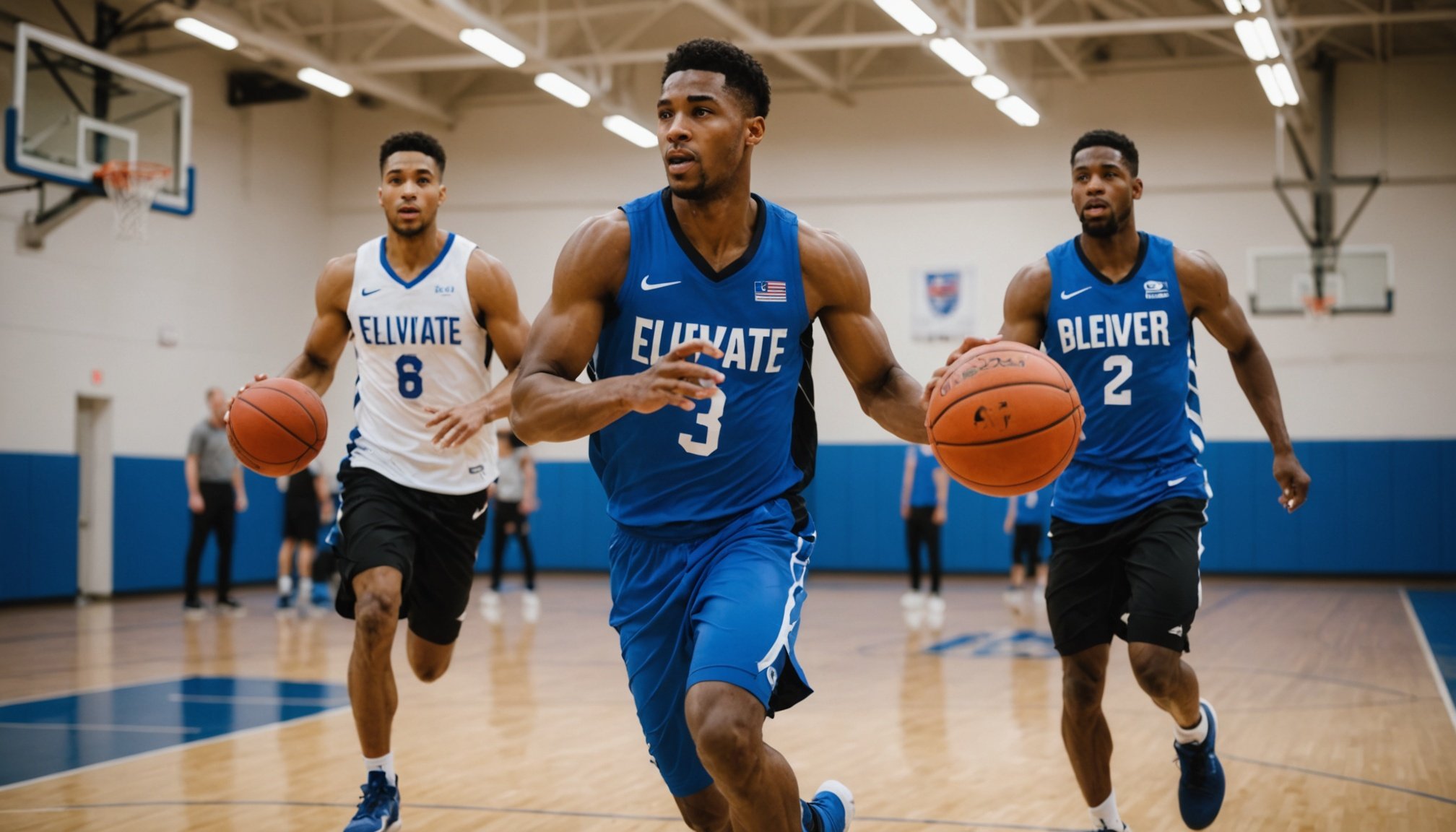Importance of Cardiovascular Fitness for Basketball Players
Cardiovascular fitness is crucial for basketball players, enhancing both athlete endurance and game performance. During a match, players need the stamina to sustain high-intensity bursts and recover quickly. Key cardiovascular fitness metrics such as heart rate, oxygen intake, and recovery rate are closely monitored to determine an athlete’s readiness and efficiency on the court.
A well-developed cardiovascular system enables players to maintain speed and agility, key performance benefits that directly impact the game’s outcome. Endurance allows them to keep up intensity levels throughout the game, efficiently transition from defense to offense, and recover rapidly between plays. This sustained energy level can be the difference between victory and defeat.
Additional reading : Ultimate time management guide: smart strategies for uk basketball players juggling training and personal life
Beyond on-court advantages, high levels of cardiovascular fitness offer long-term health benefits. These include a reduced risk of heart disease, better overall health, and increased mental resilience. Maintaining cardiovascular fitness can support players not only in their basketball careers but throughout their lives.
For athletes aiming to boost their game, focusing on cardiovascular health lays a strong foundation. It enhances their potential to excel and, importantly, helps them lead healthier, more active lives.
Also to discover : Maximize your game: the ultimate heart rate monitor guide for uk basketball players to boost training efficiency
Introduction to Interval Training
Interval training is a powerful tool in the realm of basketball training, offering athletes a unique approach to boosting performance. Unlike traditional cardio workouts, interval training involves alternating periods of intense effort with rest or lower intensity. This method helps basketball players develop the explosive energy and quick recovery needed on the court.
The principles behind interval training are simple: push hard during high-intensity phases to maximise exertion, then use short rest periods for recovery. This cycle is repeated, allowing athletes to enhance their fitness methods efficiently. By engaging in these intense bursts, basketball players can improve both cardiovascular and muscular endurance, vital for maintaining pace during a game.
For basketball players, the importance of interval training cannot be overstated. It mirrors the sport’s dynamic nature, preparing athletes for the fast transitions and sustained energy demands they face. Interval training also counters the monotonous nature often associated with traditional cardio routines, keeping workouts dynamic and motivating.
Through interval training, athletes not only build endurance but also sharpen mental resilience and focus, crucial aspects for peak basketball performance. This training method aligns perfectly with the needs of basketball, making it an indispensable part of any comprehensive training regimen.
Structured Interval Training Programs for Basketball Players
In the pursuit of peak basketball performance, integrating structured interval training into your regimen is pivotal. Interval training offers diverse fitness methods that cater to different proficiency levels, enhancing basketball conditioning effectively.
Beginner Level Interval Training
For novice players stepping into interval training, a balanced workout structure is key. A typical session might include alternating between 30-second sprints and a 90-second rest, allowing athletes to build foundational stamina. Incorporate exercises such as shuttle runs or jumping jacks with care, ensuring rest is adequate to prevent burnout. Using progress tracking tools like a heart rate monitor can help beginners reflect on their advancements and adjust their routines accordingly.
Intermediate Level Interval Training
Intermediate athletes aiming to boost endurance might explore more intense sessions, like high-intensity shuttle drills. Increasing sprint duration to 45 seconds, with a 60-second rest, can present added challenges. As intensity heightens, modifications like introducing resistance bands can further push limits. Progress should be reassessed after 4-6 weeks, maintaining a focus on stamina and adjusting to optimise results.
Advanced Level Interval Training
Elite athletes require sophisticated strategies, incorporating sport-specific drills like defensive slides within interval regimens. Precision and recovery dominate the focus, with nutrition playing an essential role. Integrating dynamic drills with longer intervals ensures mental resilience remains unyielding, forging a well-rounded, high-performance athlete ready for competitive demands.
Evidence-Based Fitness Tips for Enhancing Performance
To elevate athletic performance in basketball, incorporating evidence-based fitness tips is essential. Research underscores consistent cardiovascular workouts as a cornerstone for enhancing endurance and agility, pivotal for maintaining basketball performance.
Dos and Don’ts of Cardiovascular Workouts
- Do engage in interval training. This dynamic method mimics game-paced activity and improves both endurance and recovery.
- Don’t ignore warming up. Proper warm-ups reduce injury risk and prepare muscles for exertion.
- Do include varied exercises, like sprints and agility drills, to target different muscle groups and keep workouts engaging.
- Don’t overlook rest. Incorporate rest days to allow recovery and prevent burnout.
Importance of Consistency and Assessment
Maintaining a regular training schedule promotes incremental improvements and helps athletes track progress. Consistent assessment of endurance and agility levels ensures workouts remain effective and challenges are appropriately scaled. Using tools like heart rate monitors can aid in this process, providing measurable data to fine-tune fitness methods.
Commitment to these practices builds a robust foundation, helping players enhance their basketball skills and resilience on and off the court. With persistence and strategic training, athletes can achieve significant improvements in performance and overall fitness.
Success Stories and Testimonials
Hearing about the experiences of other basketball players can be highly motivating. Several UK athletes have shared success stories showcasing how interval training significantly boosted their game performance. For instance, one well-known UK player significantly improved his on-court endurance and speed through tailored fitness methods. Before adopting interval training, he struggled with maintaining momentum in crucial game moments. However, by incorporating high-intensity sprints and rest intervals into his routine, he achieved remarkable improvement.
These real-life experiences not only highlight physical transformation but also emphasize crucial lessons learned along the way. Many players report enhanced athlete endurance and faster recovery times between plays as beneficial outcomes of their structured interval programs.
Furthermore, testimonials reveal how resilience and mental toughness were developed alongside physical benefits, echoing the importance of interval training. Players speak highly of the adaptability this method offers, allowing them to keep workouts engaging and dynamic. Insight from those who’ve walked the path offers inspiration and provides a robust framework for others looking to enhance their basketball performance through structured methods.
Benefits of Cardiovascular Fitness for Basketball Players
The performance benefits of cardiovascular fitness for basketball players are undeniable. Players with high cardiovascular fitness experience improved agility and speed, crucial for both offense and defense transitions on the court. They have the endurance to maintain performance throughout a game, directly impacting their overall game impact.
Enhanced recovery between plays is another significant advantage. Quick recovery times allow players to maintain their intensity level, reducing fatigue as the game progresses. This ability to recover swiftly between bursts of activity can be a deciding factor in critical match moments.
Beyond physical advantages, cardiovascular fitness contributes to numerous psychological benefits. These include increased mental alertness and better stress management, which are essential for making strategic decisions during high-pressure situations. Players often report higher levels of mental toughness and confidence, attributes vital for competitive sports.
Overall, the commitment to maintaining solid cardiovascular health ensures that players not only excel in their current games but also lay a foundation for long-term health advantages. These benefits encompass reduced risks of heart disease and improved overall wellbeing, supporting players throughout their careers and beyond into their active lifestyles.
Nutrition Advice for Optimal Cardiovascular Fitness
Enhancing cardiovascular fitness isn’t solely about exercise; proper nutrition tips are essential to elevate athletic endurance. A diet rich in carbohydrates, like whole grains, provides the fuel necessary for strenuous basketball performance. Carbohydrates ensure muscle glycogen stores are sufficiently charged, supporting athletes during rigorous games and intensive training programs.
Proteins play a vital role in muscle repair and recovery. Incorporating lean sources, such as chicken or tofu, assists in rebuilding muscles after intense workouts. Meanwhile, healthy fats from avocados or nuts support long-term energy storage, crucial for maintaining stamina.
Sample Meal Plans
Tailored meal planning can significantly impact energy and recovery. Pre-game meals might include brown rice with grilled chicken, complementing energy-exerting efforts. Post-training, a protein-rich smoothie can facilitate muscle recovery.
Importance of Hydration
Never underestimate hydration’s role. Adequate fluid intake maintains optimal performance levels and aids in quick recovery. Drinking water consistently throughout the day, particularly before and after practice, is non-negotiable. Electrolyte-rich drinks may also prove beneficial after intense games.
By integrating these nutritional components into daily regimens, basketball players can enhance their cardiovascular abilities, ensuring sustained performance and enduring health benefits.
Overcoming Common Challenges in Training
Navigating training challenges is crucial for UK basketball players keen on honing their skills. Common pitfalls, such as inconsistent workouts and motivation dips, often hinder progress. To combat these, setting realistic goals and maintaining a routine can significantly boost motivation. An effective strategy involves breaking down larger goals into manageable tasks, making consistent progress more attainable.
Building accountability is also essential. Engaging with a training partner or coach can provide encouragement, as well as constructive feedback, ensuring you stay committed to your regimen. Additionally, integrating variety into your workouts can prevent monotony. Altering exercises, intensities, or settings can invigorate training sessions and enhance focus.
To overcome consistency hurdles, a structured training plan helps. Utilizing technology, such as fitness apps and scheduling tools, can aid in tracking and adjusting routines. These resources not only streamline training but also highlight achievements, fostering a sense of accomplishment.
Moreover, accessing community networks offers invaluable support. Engaging with local basketball clubs or online forums encourages the sharing of experiences and strategies. Leveraging these resources empowers athletes to tackle obstacles, innovate their training approaches, and sustain long-term dedication across their basketball journeys.
Resources for Implementation
Bringing cardiovascular fitness to its pinnacle for enhanced basketball performance requires strategic use of resources. For aspiring athletes, having access to quality training resources can be transformative. Various online platforms offer an array of training resources including interval training videos that cater to different skill levels, from beginner to elite.
Crafting a personalised workout regime becomes easier with platforms offering custom workout plans. These tailored plans consider individual capabilities and goals, ensuring that each player can maximise their athlete endurance. Engaging with community resources is equally beneficial. UK basketball players can find support networks through local clubs or online forums, where experiences and valuable insights are exchanged.
These communities help maintain motivation, creating an encouraging environment for consistent improvement. In addition, feedback from peers or mentors can offer new perspectives on fitness methods, enabling adjustments that better align with personal goals. Lastly, for those seeking expert guidance, consulting certified trainers via these platforms can provide structured advice and innovative approaches to enhance cardiovascular fitness, all while remaining committed to the dynamic, fast-paced nature of basketball training.











